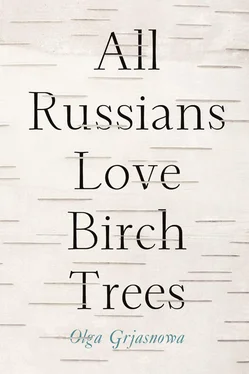We couldn’t stay in Azerbaijan.
My father refused to go to Israel. Every morning my mother spoke about the anti-Semitism in Russia, but in private couldn’t imagine my father living in a Jewish state either. Besides, the words Occupied Territories, army , and Jewish state didn’t quite fit her utopia.
In 1990 my aunt immigrated to Israel. My parents didn’t go along. Both had good jobs and decided to wait. At first there was the hope of getting into the United States or Canada, but those borders were the first to close. The remaining options were Germany and Israel, but only as a Jew, and thus the register in the synagogue filled up, as did the immigration applications at the German and Israeli embassies. The same people who were bribed to erase the word Jew from passports and birth certificates in the past were now bribed to do the opposite.
In the meantime, the Gulf War broke out. Iraq launched Scud missiles against Israel and my mother sat in front of the TV, desperate, telephone in hand. Of course that was useless as international calls had to be ordered weeks in advance.
My relatives spent their first Israeli winter in bunkers wearing gas masks. My mother decided that she wouldn’t under any circumstances follow them. Initially the idea to go to Germany of all places seemed just as absurd to my parents. In 1994 my mother still claimed that she would never set foot in this country — the ashes were still warm. My grandmother was a survivor. Nine months later, my parents filed an application for emigration at the German embassy. In 1995 the application was approved and we began selling our things: first household electronics and kitchen equipment, then the furniture. My mother didn’t have long to think about whom to leave her grand piano. Every sale was celebrated with a meal. Food was available again, if at exorbitant prices. Only the books didn’t find a new owner. The two thousand volumes made for a big heap of trash. In 1996 we were in Germany. In 1997, for the first time, I considered suicide.

Friedberg was the final stop. I got off. The weather was bad, the houses low and quiet. In front of the train station it smelled like urine and a twelve-year-old yelled “cunt” in my direction. As I turned around to face him, he laughed out loud and said something in Turkish to his friends, who wolfed down stir-fried noodles in front of a Chinese take-out shop. Now the whole group erupted in roaring laughter and I wished for them to choke on their food.
The bell gave three loud shrieks before my father opened the door. The corners of his mouth briefly twitched in surprise before resuming their usual disheartened expression. My father was a man who had understood that things would never be good. I tolerated his lips brushing my right cheek and carefully patted his back. He told me that my mother wasn’t home and wanted to know if I had eaten. Not awaiting my reply he went back up into the bedroom, to his computer and his Russian movies. I took one of my mother’s lactose-free yogurts from the fridge and sat down in front of the TV, but didn’t turn it on.
The dark brown leather sofa was covered with a beige throw. The remote control was wrapped in plastic foil. The wall shelves featured, next to the Russian edition of the complete works of Feuchtwanger, framed photos of better days: my mother and I at the beach in front of a sandcastle; my grandparents’ wedding picture; my father as a young man, at the gate of the Yuri Gagarin Training Center. All Russians wanted to be cosmonauts, but my father actually was one. Just one who never got to go into space. Father was a member of the Communist Party, just like Yuri Gagarin. He graduated from flight school with honors, studied — like Gagarin — at the military academy for air force engineers in Moscow, completed the cosmonaut training — like Gagarin — but that’s where their parallel story ends. Nobody knew why. Father returned to Baku, and nobody resented him for this setback, nobody saw his return as defeat. He got a post at the ministry and became a respected and very busy man. I think that and the collapse of the Soviet Union were the big surprises in his life.
Sometimes when he got home from work he took me up to the roof. There he set up a telescope and explained the constellations to me, whispered their names into my ear, as if we were the only two people who knew those names, as if they were a secret between us. I felt his warm breath, smelling of almonds, and if father had had a drink before, he’d bring me to bed, let me change into my nightgown, give me a kiss, his beard stubble brushing against my cheek, and stroke my hair. Then he’d lay his hand on the radiator just as gently as he had touched my head earlier and leave the room.
Germany had no use for my father. In his social Siberia he wore jogging pants and those undershirts that are called wife beaters (not that he ever did). From one day to the next, Father had given up. He didn’t befriend other people. He rarely left the house, and if so, it was mostly to compare prices at gas stations.
Mother went to the kitchen first. Father came down, took a seat at the table, and started stuffing cigarettes. In a sweeping action, Mother opened the fridge door. My job was to squeeze a lemon and dice an onion. She heated olive oil in a heavy cast iron pan and searched for rosemary. Father waited impatiently until the fish had gained a golden-brown crust and opened a bottle of wine. At the dinner table my mother sometimes talked about her piano students. My father and I took turns asking questions when the silence became unbearable. During dessert my father listed all his acquaintances who had ever broken a bone and my mother corrected him every time. Her eyes were as big and dangerous as headlights.
I had wanted to leave the next morning, but mother was already defrosting the lamb for dinner. I didn’t dare to go. The second evening got melancholic. My parents sat on the couch and reminisced about the glimmering surface of the water in the bay of Baku, the tour boats, and Rostropovich’s performances. Almost all the memories they’d kept were pleasant. They had intentionally forgotten about the corruption, the National Front, the lines in front of empty grocery stores and Western embassies, often stretching several kilometers long. On the other hand, the memories of the lines amused my mother, as did those of the home for asylum seekers and the Baltic herring. Back then, a major part of our diet consisted of the aforementioned Baltic herring as well as illegally fished and processed caviar. But you couldn’t get bread or anything else — just Baltic herring. I would stand in line with my mother for hours to get them. In candlelight — electricity had become rare, as had candles, actually — my mother gutted the fish with her pianist hands.
When I returned to Frankfurt two days later, I had three bottles of kosher wine in my bag. My mother never drank this wine. She ordered it through the synagogue, to do the rabbi and God a favor, only to then order twice the amount of Georgian wine from her friends. The market-based correlation between the sale of kosher wine through the synagogue and that of Georgian wine in the community center was striking.
Even the floor-to-ceiling windows along one wall couldn’t brighten the dark wood-paneled interior of the room. On the bar stood a vase with lilies. The wall to the right sported a flat-screen TV that showed CNN on mute. During lunch hour the bar was always crowded with bankers who spoke English with European accents, loosened their ties, and ordered sandwiches.
Cem stared at the TV. The cafe had only opened half an hour ago. The waiter stood listlessly behind the bar and polished glasses with a checkered dish towel. His jaw-length hair fell into his face.
Читать дальше













